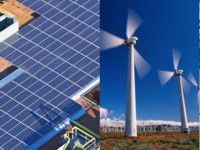IPCC Releases Special Report on Renewable Energy Sources
 Almost 80 per cent of global energy to come from renewables
Almost 80 per cent of global energy to come from renewablesby 2050 says IPCC
The Intergovernmental Panel on
Climate Change (IPCC) has released its long awaited special report
on renewable energy sources (SRREN).
The SRREN report enables policy makers, the private sector and
civil society globally to identify ways in which to integrate
renewable energy technologies into future energy systems. The
report also offers a snapshot of environmental and social
consequences associated with the integration.
The 26-page report
provides a summary of a 1,000-page comprehensive assessment
compiled by more than 120 experts working for the IPCC’s Working
Group III. It is based on modeling for more than 160 different
scenarios of the uptake of renewable energy, which are condensed to
four over-arching scenarios.

Abu Dhabi witnessed ten days of activity related to IPCC as host
to the committee in charge of finalizing the SRREN report. This is
being followed by the 33rd
(10 - 14 May) attended by more than 600 delegates representing all
member countries of the UN.
Dr. Al Jaber said: “Following the release of the IPCC fourth
Assessment report and its clear language on the role of renewable
energy in mitigating climate change, it was obvious to many
countries that a more detailed report on renewable energy would be
crucial in future dialogues.
“Taking into consideration the due diligence conducted by the
IPCC authors and technical experts on all its reports, the UAE
views this as an affirmative signal on the importance of its
ongoing drive towards development, deployment and commercialization
of renewable energy technologies worldwide through the Masdar
Initiative.”
“Moreover, the fact that the UAE is hosting the release of this
very important report is further testament to the international
community’s confidence in our ongoing efforts,” he added.
“As someone who has been following
closely the progress Abu Dhabi is making in the renewable energy
sphere, it makes perfect sense for the IPCC to release this
significant report in the UAE.” Dr. Rajendra K. Pachauri, Chairman
of the IPCC
“Abu Dhabi is investing so heavily and responsibly in renewable
energy. It is fast becoming the renewable energy center of gravity.
It gives me a great sense of pride to have been someone who
followed this progress since the beginning. I believe we will see
even more innovation and engagement from Abu Dhabi in the
future.”
The report concludes
that concerted policy efforts could result in the rapid rollout of
renewable energy technologies, although the proportion of renewable
energy will increase even without enabling
policies.
It also predicts that
the emergence of renewables as the dominant energy source could
lead to cumulative greenhouse gas savings equivalent to 220 to 560
gigatonnes of carbon dioxide between 2010 and
2050.
capacity grew in 2009-wind by over 30 percent; hydropower by three
percent; grid-connected photovoltaics by over 50 percent;
geothermal by 4 percent; solar water/heating by over 20 percent and
ethanol and biodiesel production rose by 10 percent and 9 percent
respectively.
Twenty one years ago, in 1988, the United Nations Environmental
Programme (UNEP) and the World Meteorological Organization (WMO)
established the Intergovernmental Panel on Climate Change to
provide independent scientific advice on the complex and important
issue of climate change.
The panel was asked to prepare, based on available scientific
information, a report on all aspects relevant to climate change and
its impacts and to formulate realistic response strategies. The
first assessment report of the IPCC served as the basis for
negotiating the United Nations Framework Convention on Climate
Change (UNFCCC).
Since then, the IPCC has remained the most important source of
scientific, technical and socio-economic information to many of the
world’s most relevant stakeholders.
So far, the IPCC has produced four assessment reports. The IPCC
4th Assessment Report (AR4) resulted in the awarding of a Nobel
Peace Prize to the former Vice-President of the United States and
the IPCC for their “efforts to build up and disseminate greater
knowledge about manmade climate change, and to lay the foundation
for the measures that are needed to counteract such change”.
The publication of the fifth assessment report is due in
2012
target=”_blank”>The full SRREN report is available for download
here.
You can return to the main Market News page, or press the Back button on your browser.

